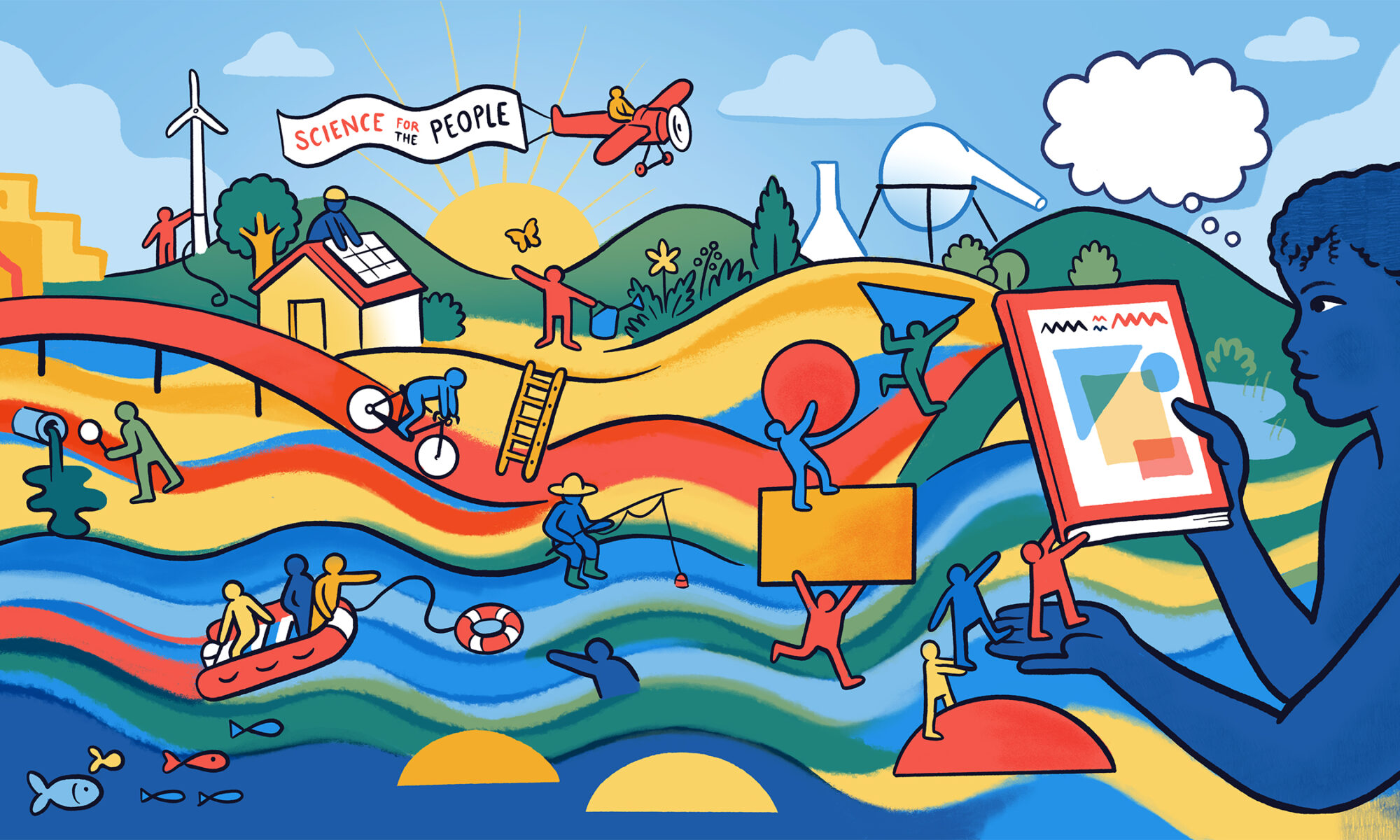A Science for the People virtual teach-in series on:
A People’s Green New Deal
Organized by SftP Climate Change working group and the People’s Green New Deal editorial collective, this series of virtual teach-ins features authors of the magazine issue on a People’s Green New Deal, community organizers and activists of a broad variety of issues covering agroecology, labor and a just transition, energy democracy, art and design, indigenous knowledge and much more. You can find all the recordings and related documents on this page.
This teach-in series is endorsed by:
Related magazine article(s): Cooking the Niger Delta: Cook Stoves, Gas Flares and the Story of Waste by Jennifer Tang; Green New Deal: top-down or bottom-up? by Sergio Belda and Victoria Pellicer; Indigenous Knowledge, the Struggle for Land, and Indigenizing the Green New Deal by Ragina Johnson and Brian Ward.
Panelists: Max Ajl is an associated researcher with the Tunisian Observatory for Food Sovereignty and the Environment and a postdoctoral fellow with the Rural Sociology Group at Wageningen University. He writes on the place of the countryside in global development, and researches Tunisian national liberation, planning and political economy, and Arab dependency theory and agrarian issues. His forthcoming book is A People’s Green New Deal, and among his recent articles are “Does the Arab Region Have an Agrarian Question?” and “The hidden legacy of Samir Amin: delinking’s ecological foundation”. Sergio Belda is lecturer and researcher in the Faculty of Economics at the University of Valencia. He has academic and activist experience in the fields of transformative consumption and bottom-up organizations for eco-social transitions. He has played an active part in local social movements in Valencia in the last 15 years, particularly regarding food sovereignty and the right to the city. Thea Riofrancos is an assistant professor of political science at Providence College, an Andrew Carnegie Fellow (2020-2022), and a Radcliffe Institute Fellow (2020-2021). Her research focuses on resource extraction, renewable energy, climate change, green technology, social movements, and the left in Latin America. These themes are explored in her book, Resource Radicals: From Petro-Nationalism to Post-Extractivism in Ecuador (Duke University Press, 2020) and her co-authored book, A Planet to Win: Why We Need a Green New Deal (Verso Books, 2019). She is a member of the Democratic Socialists of America and serves on the steering committee of the organization’s Ecosocialist Working Group. Brian Ward is an educator, socialist and activist who lives in Madison, Wisconsin (occupied Ho-Chunk Land), and has lived and worked on Pine Ridge Indian Reservation, home of the Oglala Lakota Nation. He is a member of The Red Nation-Great Lakes and People’s Green New Deal Madison. He contributed to the book 101 Changemakers: Rebels and Radicals Who Changed U.S. History and his writing has appeared in The Nation, Truthout, New Politics, Science for the People, and more. Jennifer Tang has an MA in European Culture, Society, and Politics from the University of Groningen in the Netherlands. Her thesis “Shell #makethefuture and the Global Alliance for Clean Cookstoves in Nigeria: how a fossil fuel corporation obstructs climate justice through climate action denial” explored how Royal Dutch Shell and its allies manufacture a false dichotomy between energy access and climate action to lock in decades of fossil fuel dependence and delay Nigeria’s just transition to renewable energy. She currently organizes with Solidarity & Mutual Aid Jersey City and the International Coalition for Human Rights in the Philippines.
Moderator: Lala Peñaranda coordinates Latin American trade unions at Trade Unions for Energy Democracy and is a co-founder of Science for the People NYC. She is the Americas co-chair for the DSA International Committee and previously worked with unions in Colombia on agrarian reform.
Related magazine article(s): Indigenous Knowledge, Western Science and the US Colonial Project by Ragina Johnson and Brian Ward; Indigenous Knowledge, the Struggle for Land and Indigenizing the Green New Deal an interview with Dina Gilio-Whitaker by Ragina Johnson and Briad Ward.
Panelists: Brian Ward is an educator, socialist and activist who lives in Madison, Wisconsin (occupied Ho-Chunk Land), and has lived and worked on Pine Ridge Indian Reservation, home of the Oglala Lakota Nation. He is a member of The Red Nation-Great Lakes and People’s Green New Deal Madison. He contributed to the book 101 Changemakers: Rebels and Radicals Who Changed U.S. History and his writing has appeared in The Nation, Truthout, New Politics, Science for the People, and more. Tomas Klemm is a citizen of the Pokagon Band of Potawatomi Indians. He currently is a doctoral student in Political Science at the University of Michigan studying Indigenous politics and the politics of development. Outside of work, Tom is a member of The Red Nation-Great Lakes and remains active in the Pokagon community as well as the broader Anishinaabe community.
Moderator: Siddhant Pusdekar is a member of the Science for the People Twin Cities chapter.
Related magazine article(s): Tending Habitat and Other Poems by Emily Cohen; A Just Transition for the Building Sector: The Architecture Lobby’s Retroactive Roadmap, by Valérie Lechêne; An Atlas for a Green New Deal by Billy Fleming et al.
Panelists: Mariah-Rose Marie and Emily Cohen, both California residents inspired by the land they inhabit and its relationship to people, draw from their experience as artists and activists in conversation.
Billy Fleming and Valérie Lechêne, both transdisciplinary architects deeply engaged with the Green New Deal, discuss their visions for the role of design fields in a people’s movement, including design for social movements and the role of professional unions.
Moderators: Mara Freilich and Andres Chang are both members of Science for the People.
Related magazine article(s): A New Vision for American Agriculture: The Just and Equitable Transition Toward Agroecology, by Krista Marshall and Kelsey Brewer.
Panelists: Eric Holt-Gimenez, Ph.D. was the executive director of Food First/Institute for Food and Development Policy. Called one of the country’s “most established food think tanks” by the New York Times, Food First’s mission is to end the injustices that cause hunger, poverty and environmental degradation throughout the world. He is the author and editor of several books, including, Can We Feed the World Without Destroying It?; A Foodies Guide to Capitalism; Land Justice; Food Movements Unite!; Food Rebellions; and Campesino a Campesino. Krista Marshall is currently a PhD student in California studying agroecology through collaborations with researchers, farmers, and extension specialists. She was drawn to agroecology because of its foundations in food sovereignty as the basis for reconnecting people with our food productions and the ecosystems that support them (presentation slides). Katia R. Avilés Vázquez holds a PhD in Geography from the University of Texas at Austin. Her research highlights community-based adaptations, and engages the topic from a grassroots activism perspective, to both continually test its validity, and increase its reach. She has co-authored more than a dozen articles, book chapters, and technical reports, including Organic Agriculture and the Global Food Supply. Her work has been highlighted in local and international news outlets, and she has received the EPA Environmental Champion Award, as well as the ESF Graduate of Distinction Award. Helda Morales is a professor in agroecology and sustainable food systems at El Colegio de la Frontera Sur, a research center in San Cristóbal de Las Casas, Chiapas. She conducts research on how to scale out agroecology, while working with teachers, urban farmers, women organizations and farmers’ markets.
Moderator: Ivette Perfecto is Professor of Environmental Justice at University of Michigan and a member of Science for the People.
Related magazine article(s): Energy Democracy: Powering Communities Toward Justice and Equity, by Anthony Giancatarino and Denise Fairchild.
Panelists: Anthony Giancatarino has led the Just Community Energy Transition project for the last 3 years to advance energy democracy and a regenerative economy (presentation slides). Shauna McKenna is a member of the Democratic Socialists of America’s San Diego chapter, where she is a co-chair of their Public Power San Diego campaign. Victoria Pellicer-Sifres is Energy Officer in Valencia (Spain) City Council, researcher and teacher at the Universitat Politècnica de València, and activist in the renewable energy cooperative Som Energia (presentation slides). Lala Peñaranda coordinates Latin American trade unions at Trade Unions for Energy Democracy and is a co-founder of Science for the People NYC. She is the Americas co-chair for the DSA International Committee and previously worked with unions in Colombia on agrarian reform (presentation slides). Chris Kramer is a Co-Chair of the Boston Democratic Socialists of America TakeBackTheGrid campaign.
Moderator: Ben Allen is member of the East Tennessee chapter of SftP and organizes with the Tennessee Valley Energy Democracy Movement (presentation slides).
Related magazine article(s): Dignity Over Dumping: The Fight for Climate Justice and a Just Transition for Sanitation Workers, by Zakia Elliott, Alison Kenner, and Morgan Sarao.
Panelists: Lara Skinner, Co-Executive Director of The Worker Institute at Cornell and Chair of the institute’s Labor Leading on Climate Initiative. Zakia Elliot, Program Manager of Philadelphia Climate Works. Paul Prescod, public school teacher and political liaison with the Philadelphia Federation of Teachers.
Moderator: Rebecca Orrison is a co-convener of the Science for the People’s Climate Change working group and member of Capital District DSA, located in Albany, NY.



